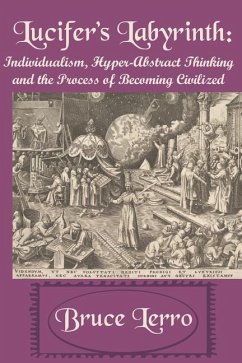The angel "Lucifer" was the bringer of light. However, this is not the light of love and harmony. Lucifer brings light to western humanity by inviting us to taste the fruit of the Tree of Knowledge. Lucifer's Labyrinth is the secular odyssey of what happened to humanity after we left the Garden, peppered by blind allies, thunder and lightning. Lucifer's Labyrinth treks from the Middle Ages through the Gilded Age.Unique features of this book include: -Interdisciplinary, spanning the fields of western history, macro-sociology, social history, politics, political economy, philosophy of science, comparative religion and psychology. Like the god Hermes, this book crosses the worlds.-Macro-micro link: Many books on Western history treat psychology as if it was insulated from historical processes and subject to laws of its own. Lucifer's Labyrinth argues that changes in technology, economics and politics determine what the direction of psychology is most likely to take.-Its unique Vygotskyan approach to Western history. In the United States Vygotsky is known as a child psychologist. Few realize that his colleague Alexander Luria applied Vygotsky's work to historical changes in peasant life after the Russian revolution. Lucifer's Labyrinth is one of the only books to apply Vygotsky's work to another historical period.-It poses provocative questions. What does the invention of coined money do to humanity's reasoning processes? Why did the printing press change the sense ratios? What is the difference between being civilized and being disciplined? Why did statistical reasoning only develop in the 17th century? What institutions need to emerge before Piaget's formal operations can function? Why do very few of Erikson's psycho-social stages of development apply to childhood, adolescence and adulthood before the 18th century?-There is an abundance of comparative tables which summarize sub-sections of chapters, guiding the reader from beginning to end. These tables give the reader a "snapshot" of a historical period or they depict a "movie" of howl spiritual or psychological process has evolved.-The book is scholarly without being academic. The book is dense but juicy. An educated lay reader can understand the general argument without any previous background. Bruce Lerro is a socio-historical psychologist in the traditional of Lev Vygotsky. He has been a college instructor for 27 years. Lucifer's Labyrinth is the sequel to his book Forging Promethean Psychology
Bitte wählen Sie Ihr Anliegen aus.
Rechnungen
Retourenschein anfordern
Bestellstatus
Storno






